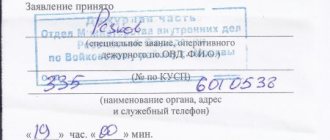Conditions for terminating a criminal case for reconciliation
In accordance with the above norm and Article 25 of the Code of Criminal Procedure of the Russian Federation, an investigator with the consent of the head of the investigative department, an investigator with the consent of the prosecutor or the court has the right to release the person who committed the crime from criminal liability if a number of conditions are met:
1. the perpetrator committed a crime of minor or medium gravity;
2. the offender committed the crime for the first time;
3. the perpetrator reconciled with the victim and compensated him for the material and moral damage caused by the crime.
4. The victim filed a written application to terminate the criminal case.
The listed conditions are mandatory for the possibility of terminating a criminal case through reconciliation with the victim. However, since termination of a criminal case is a right and not an obligation of these officials, when resolving this issue, they take into account the characterizing data of the perpetrator, his age, state of health, marital status, the circumstances of the crime, and the reasons for the reconciliation of the perpetrator with the victim. If a person has an expunged criminal record, then the period of time that has passed since the commission of the previous crime should be taken into account.
As stated above, the law grants the right to terminate a criminal case for reconciliation with the victim to the investigator (interrogating officer), but in practice they almost never do this, since the head of the investigative department and the prosecutor, in pursuit of the notorious indicators, do not give their consent to terminate the criminal case.
Petition to return the criminal case to the prosecutor
Petition to return the criminal case to the prosecutor
A criminal case was sent with an indictment against D., accused of committing a crime under Part 1, Article 264 of the Criminal Code of the Russian Federation, to the ______________ District Court of the city ___________.
The victim in the criminal case is M., whose interests in the criminal case are carried out by me as a lawyer.
Having read the indictment, I believe there is sufficient data for the court to apply the provisions of Article 237 of the Criminal Code of the Russian Federation with a decision to return this criminal case to the prosecutor on the following grounds:
In accordance with clause 6, part 1, article 237 of the Code of Criminal Procedure of the Russian Federation, the judge returns the criminal case to the prosecutor if circumstances are revealed that entail a change in the criminal legal classification of the actions of the accused in the direction of worsening his situation, since in court proceedings the worsening of the defendant’s position is not allowed.
In this criminal case, the investigator drew up an indictment, which distorts the circumstances of the accident that actually took place, which is an obstacle to passing a verdict.
Thus, in their testimony, the accused D., as well as the defense witness I., gave deliberately false testimony regarding the circumstances of the accident, as well as about the actions of the driver of the car _____________, who, most likely, was another person and not the accused D. What also follows from the testimony witnesses Z., Sh. and T., drivers of vehicles who directly observed the accident and how the car ___________________ fled from the scene of the accident with one driver, and returned back with the accused D. at the wheel, who was in different clothes, thinner and taller than the original driver.
The investigator superficially checked the testimony of the accused D. and his relative, witness I., which is why it is hidden from the criminal legal assessment that the driver _______________, after hitting the victim M.___________, fled the scene and did not take any action to provide assistance to the victim, or to call an ambulance, which must be given an appropriate legal assessment.
D.'s subsequent return to the scene of the crime as the driver ___________________ who committed the accident, and his admission of guilt is a mitigating circumstance in relation to the actions of the driver _____________, containing signs of another crime provided for in Article 125 of the Criminal Code of the Russian Federation, namely, leaving a person who was hit by a car - the victim M. is in danger. At the same time, the very version that it was D. who was the driver of ________________ at the time of the collision with the victim M. has not been verified and is based only on the testimony of the accused D. and his close relative D.i.
The indictment completely lacks a description of these actions of the driver ________________, although there are witnesses who, for some reason, are not named in the indictment and their testimony is not given, which raises doubts about the objectivity of the investigator who carried out the preliminary investigation in this criminal case. At the same time, the investigator must correctly and fully establish and describe in the indictment all the factual circumstances of the crime, which must be given a proper legal assessment. For example, the very fact that the driver ______________ attempted to escape from the scene of the crime obligated the investigator to indicate in the charge that the driver ________________ grossly violated the requirements of clause 2.5. and 2.6. SDA (Road Rules). The investigator should have questioned the accused D. about this, but in the records of his interrogation, the investigator did not ask these questions.
As for witness D.i., in this criminal case there are grounds for conducting an inspection against her and making a procedural decision in accordance with Articles 144-145 of the Code of Criminal Procedure of the Russian Federation to initiate a criminal case under Article 307 of the Criminal Code of the Russian Federation, since her testimony is inconsistent with other evidence, including the accident diagram.
If the wording of the charge does not contain information about what actions were taken by the accused D. and other passengers _________________ after the driver ________________ hit the victim, then the incompleteness of the investigation in this part excludes the verdict, which must establish all the circumstances of the accident and all these circumstances must be be given proper legal assessment.
The section of the road where the accident occurred is covered by surveillance cameras. However, the investigator did not indicate anything about this in the indictment. Therefore, it is unclear whether the investigator made all the necessary efforts to obtain video recordings from these surveillance cameras containing objective information about this accident. Including information about who was driving _________________.
With the help of surveillance cameras and video recorders available on other vehicles, it was possible to determine the speed at which the car _____________________ was moving at the time of the accident, which obviously could not have been the same, as the accused D. and defense witness D.i. testified. during their interrogation.
Please note that several drivers witnessed the accident and were there until the arrival of the traffic police and emergency medical services. They should have been interrogated and it was possible to find out from them the essential circumstances of the incident, including asking questions about who the driver of ________________ was and what actions he took before and after the accident. The traffic police officers were aware of this from the words of drivers of other vehicles funds, but these traffic police officers were not interrogated and their testimony is not included in the indictment. There is only a report from the traffic police officer, but the report is the basis for the interrogation of its author, and not another document that replaces the interrogation protocol. The traffic police officers were also not questioned regarding the circumstances of drawing up a protocol for the inspection of the accident scene.
The foregoing is essential for clarifying the circumstances entailing a change in the charge brought against D. to a more serious one based on his factual circumstances and the filing of charges against him also under Article 125 of the Criminal Code of the Russian Federation, which has a formal composition, the objective side of which lies in the inaction of the driver _______________________, who is not only measures were not taken to provide assistance to the victim, but who fled the scene of the accident, which is one of the grossest violations of traffic rules, containing signs of Article 125 of the Criminal Code of the Russian Federation, given that the victim “miraculously survived,” but it is not yet clear what will happen to his health in the near future.
On the basis of the above,
ASK:
Return the criminal case against D. to the prosecutor to eliminate violations of the law committed by the investigator when drawing up the indictment and by the prosecutor when approving it.
Consultation with a criminal lawyer 8
Send a request to WhatsApp
for a call back
Criminal lawyers. Read more...
Arbitrage practice
At the same time, courts willingly dismiss criminal cases on this basis, even if not always legally and justifiably. Various practices on this issue have developed in different regions.
In accordance with established judicial practice, the following category of citizens may fall under the concept of “a person who has committed a crime for the first time”:
- persons who have never been convicted before and have never been prosecuted;
- persons with expunged criminal records;
- persons who were previously brought to criminal liability, but the criminal case was terminated for non-exonerating reasons.
In most regions, courts refuse to terminate a criminal case for reconciliation if a criminal case against this person has already been terminated on the same grounds. But in some regions there were cases of termination of a criminal case due to reconciliation with the victim again, and the higher court agreed with this.
The law does not define the procedural procedure for making amends for the damage caused by a crime. In practice, courts accept statements from victims, receipts for receipt of money or property, and acts of acceptance and transfer of property. Many judges practice a procedure in which the victim’s statement is entered into the minutes of the court hearing, in which the signature of the victim and the perpetrator is affixed.
The victim and the perpetrator can agree to receive compensation for harm in the future, which must be recorded in the minutes of the court hearing and in the victim’s application to terminate the criminal case. In some regions, courts do not terminate a criminal case for reconciliation if, at the time of consideration of the case in court, the harm has not yet been made up for.
Termination of a criminal case due to reconciliation is not possible for all crimes of minor and medium gravity. The Supreme Court of the Russian Federation, in its Ruling No. 53-005 of January 17, 2006, indicated that a criminal case cannot be dismissed for reconciliation if the crime committed by the perpetrator is directed against public safety and public order or against state power. Hence, the courts refuse to terminate a criminal case for reconciliation with the victim for crimes that have two objects, for example, against the health of citizens and public order. However, the law does not contain a direct prohibition on the termination of a criminal case after reconciliation in this category of criminal cases, and therefore many courts take a different position and terminate criminal cases. In such cases, prosecutors always object to the termination of the criminal case and protest court decisions.
Reconciliation and punishment
The law provides for the release of the accused or suspect from criminal liability in connection with the reconciliation of the parties. If the victim or his legal representative writes a statement asking to terminate the case, the court or investigator has the right to do so.
“This applies to the category of criminal cases on charges of crimes of minor and medium gravity. Mandatory condition: the damage caused must be compensated, the amount of which is determined by the parties independently. Moreover, if the culprit has previously been brought to justice, has a cleared or expunged criminal record, this procedure can also be applied to him. It should be borne in mind that termination of a case is not the responsibility of the investigator, interrogating officer or judge, but their right,” says criminal lawyer Evgeniy Erlikhman.
The investigator may terminate the criminal case if the prosecutor agrees, and the investigator - with the permission of his supervisor. The court may not take into account the opinion of law enforcement representatives. Even if a representative of the supervisory authority opposes it, the presiding officer will make his decision. In accordance with Article 15 of the Criminal Code, the court can change the category of gravity of a crime by one level. For example, if a person has committed a serious crime for which reconciliation of the parties is not provided, his category, in the presence of mitigating circumstances, can be changed to a milder one, that is, of average gravity, in which the application of the procedure is possible.
“It is better to entrust negotiations on reconciliation of the parties to an experienced lawyer. The accused and his relatives cannot always agree on possible compensation with the victim or his representatives. We can talk about both compensation for material damage caused and simple apologies,” says criminal lawyer Evgeniy Erlikhman.
It is not always possible for the parties to agree on a possible reconciliation. For example, if we are talking about an accident with human casualties, even if the culprit of the accident was sober and acted unintentionally.
“Even despite the tragedy of what happened, in a number of cases it is possible to agree on reconciliation between the parties. The dead cannot be brought back, but why ruin the life of the culprit who has completely repented of his crime, has dependent young children, or can provide financial assistance to the injured party?” — says criminal lawyer Evgeniy Erlikhman.
Termination of a criminal case following reconciliation in cases of private prosecution
The termination of a criminal case due to reconciliation with the victim under Article 76 of the Criminal Procedure Code of the Russian Federation, Article 25 of the Code of Criminal Procedure of the Russian Federation should be distinguished from the termination of a criminal case of private prosecution under Article 20 of the Code of Criminal Procedure of the Russian Federation. Termination of a criminal case in this category of cases has the following features:
1. In criminal cases of private prosecution, the victim himself decides the issue of reconciliation and termination of the criminal case. The application of the victim to terminate the criminal case for reconciliation is mandatory for the magistrate. This means that if the victim submits an application to the magistrate to terminate the criminal case for reconciliation, the magistrate must ensure that the application to the victim is made without coercion, and then make an order to terminate the criminal case.
2. The magistrate is obliged to terminate the criminal case after reconciliation of the parties, regardless of whether the perpetrator has made amends for the harm or not. In this category of cases, compensation for damage is not a mandatory element. In practice, some judges forget this.
Reconciliation of the parties in the interpretation of the Code of Criminal Procedure
The Criminal Procedure Code (CPC) of the Russian Federation in Article 25 and the Criminal Code (CC) of the Russian Federation in Article 76 consider reconciliation of the parties as the achievement of a peace agreement between the victim and the accused, subject to certain conditions. That is, the victim voices his demands, upon fulfillment of which the criminal or other prosecution of the perpetrator can be terminated, and the perpetrator agrees to fulfill these requirements.
Let's give an example that is often found in everyday life: gr. P. beat his wife, causing her minor injuries. The wife filed a statement with the police, and a criminal case was opened regarding the beating. A day later, citizen P. wrote a statement with a request to close the criminal case in connection with the reconciliation of the parties. The case was closed. It is impossible to simply withdraw a statement from the police, so in this case there is only one way out - filing an application for reconciliation of the parties to the conflict. You can withdraw the application only until the case is initiated.
In order for a criminal, civil or administrative case to be dismissed by agreement of the parties, it is necessary that the fact of reconciliation be recorded before the judge makes his decision on the case. Thus, reconciliation is possible at the stage of investigation and at the stage of trial in court, but before a court verdict is issued.
It is logical that reconciliation of the parties in a criminal case is not considered a criminal record, because it took place before the court decision was made. According to Part 2 of Art. 86 of the Criminal Code of the Russian Federation: “A person released from punishment is considered to have no criminal record.”
Important: in the unified database of the Ministry of Internal Affairs regarding a person brought to criminal liability, there will be a note that the citizen was brought to criminal liability in such and such a case, the case was terminated on the basis of Art. 25 Code of Criminal Procedure of the Russian Federation. Thus, the citizen will not have a criminal record, but the fact of involvement will remain forever.
How to file a crime report?
Every citizen in his life may encounter a situation where a crime has been committed against him, his loved ones or his organization (legal entity). In such cases, a citizen needs to file a crime complaint with law enforcement agencies regarding the initiation of a criminal case.
A statement is a reason to initiate a case if it contains at least one of two elements:
- information about signs of a crime;
- a request to bring any persons to criminal liability.
Even if such a statement does not contain signs of a crime, it is still a reason to initiate a case - it entails the obligation to accept the statement, check it and make a decision.
Guided by this article, you can write or draw up such a statement yourself.
The criminal procedure law does not impose mandatory requirements for a written statement of a crime to law enforcement agencies. Moreover, he says that a statement about a crime can also be made orally, for example, when calling law enforcement authorities immediately after the commission of a crime.
However, it should be noted that in practice the written form of appeal is much more often used.
So, what is the procedure necessary for you to be able to independently write a legally competent statement about the crime committed and have it reviewed as quickly as possible?
Firstly, it is desirable that you can give the correct qualification of the unlawful act committed, i.e. determine the article of the Special Part of the Criminal Code of the Russian Federation, containing all the signs of the crime you are reporting. If you do not have sufficient legal knowledge and cannot correctly characterize the crime committed, we recommend that you indicate the illegal act itself (for example, causing harm to health, theft or destruction of property, etc.)
Secondly, you need to determine which law enforcement agency should file a crime report. Having given the correct qualification to the act, on the basis of Article 151 of the Criminal Procedure Code of the Russian Federation, you can identify a specific body (Investigative Committee, Ministry of Internal Affairs, FSB, etc.) that investigates cases of crimes provided for in the articles of the Special Part of the Criminal Code of the Russian Federation. It should be noted that filing an application with an unauthorized body does not entail a refusal to accept this application: the law enforcement agency will independently transfer your application under jurisdiction to the agency authorized to investigate this category of criminal cases, which will undoubtedly lead to a delay in the process and the potential possibility of bringing the guilty person to justice. And finally, having decided on a specific law enforcement agency, you, based on the location of the crime, determine which territorial division of this agency you should write and submit an application to.
Thirdly, when starting to write an application, you must remember its “structure”:
- “header” of the application (it indicates in whose name you are writing the application - the head of the law enforcement agency, as well as your own data: your last name, first name, patronymic, registration address, mobile phone number);
- the main (descriptive) part begins with the type of appeal - “statement of a crime”, located in the center of the page. Next, you must indicate the place and time of the crime. If you know the motives, purposes of its commission, the form and amount of damage caused by such an act, all the circumstances of its commission, which, in your opinion, are significant for the case, as well as the guilty person or any information about him known to you;
- in the final part, you must make a note that you are aware of criminal liability for knowingly false denunciation, confirming with your signature;
- you can also attach to your application materials that, in your opinion, indicate that a crime has been committed (for example, copies of documents, audio or video recordings);
- date the application and sign it.
An important point that you should pay attention to is receiving a notification coupon that your application has been registered in the Crime Reporting Book (abbreviated KUSP). The coupon will indicate the number under which the application was registered, as well as the date of registration of the application and the details of the person who accepted it (title, position, last name). If you are not given a notification coupon, then you must insist on issuing it. It is the notification coupon, which indicates the KUSP number, that guarantees that your application will be subject to an investigation, the results of which will determine the issue of initiating a criminal case.
Regarding the question of an anonymous statement about a crime, it should be noted that such a message is recognized as one that does not contain the signature of the author or does not contain information about the author (last name, first name, patronymic, address). The unknown identity of the applicant excludes the admissibility of the document, its legal force and ability to serve as a reason for initiating a case. As a general rule, anonymous messages are not registered as statements and are not considered in criminal proceedings. If an anonymous message contains information about a crime, then it can serve as a reason for verification by means of operational-search activities, and if, as a result of such verification, signs of a crime are established, a report on the discovery of signs of a crime will serve as a reason for initiating a case (Article 143 of the Code of Criminal Procedure of the Russian Federation) .
Finally, we would like to advise you to contact professional lawyers if you need to draw up and file a crime report. Criminal lawyers of the Moscow Law Office "Osherov, Oniskovets and Partners" will always be able to:
- correctly classify the crime committed against you, your loved ones or your organization,
- correctly determine the jurisdiction of the application,
- suggest how to correctly formulate certain thoughts,
- help in filing a crime report,
- pay attention to the most important aspects.
With our help, you will be confident that the criminal complaint filed will be considered in accordance with the legislation of the Russian Federation, and the appropriate decision will be made by law enforcement agencies.






